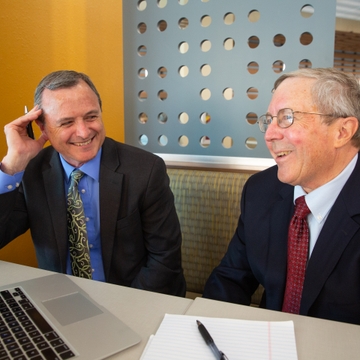Program Provides Research Opportunities for Undergraduate Students

Changing of the Guard
New Chair Takes the Helm in Neurosciences
A generation ago, brain research at the UNM Health Sciences Center was scattered across multiple departments - that is, until a reorganization proposed by Paul B. Roth, MD, MS, dean of the School of Medicine, led to the creation of the Department of Neurosciences.
Now, the department is writing a new chapter, as founding chair Daniel Savage, PhD, turns over the reins to his successor, Bill Shuttleworth, PhD, and makes plans to devote more time to his own research.
Savage, Regents' professor of Neurosciences, was elected by his peers as the department's first chair in 1997.
"We were really excited at the time because we were launching a new department," he says. Savage revamped graduate student education and helped develop the organ block medical student curriculum still in use today. He also encouraged collaborations among the department's faculty.
"The culture that we developed over time was to create a situation where faculty benefit from working effectively together, collaborating on grants and other kinds of tasks," Savage says.
The department won training grants from the National Institutes of Alcohol Abuse and Alcoholism for studying alcohol's effects on the brain, with a particular focus on babies at risk for fetal alcohol spectrum disorders.
Later, it received funding to create the New Mexico Alcohol Research Center, one of just 16 such centers in the country. Savage has for many years studied the effects of prenatal alcohol exposure on how brain cells function and how that affects behavior in those progeny.
"I wanted to deal with this largely unappreciated problem as a public health issue," Savage says. "I also wanted it to be an example of how people can come together - even in a relatively small institution - and do more than one might think they would be able to do."
Shuttleworth, a Regents' professor of Neurosciences, says that Savage's vision has been vital to the department's success.
"I don't think it's necessarily always about creating people to do what we do, but I think it's about providing the environment where people can come and learn what it is to think critically," he says.
Shuttleworth joined the department as a young researcher without much experience, but his colleagues pushed him toward a tenure track position. "Dan and all the faculty actually were really supportive when I was very unproven," he remembers.
His own work focuses on spreading depolarizations - "brain tsunamis" that leave behind a wake of inactivity after brain trauma. His research suggests these depolarizations might be involved in many conditions besides stroke and traumatic brain injury.
The Neurosciences faculty have proven their cohesiveness and they share a sense of purpose, he says.
"The brain is the last great frontier - walking in to work, I think there's still a feeling like we're picking away at one of the biggest, most interesting mysteries there is," Shuttleworth says.
Savage meanwhile is looking forward to spending more time in the lab and reflects back on his time as chair with satisfaction.
"There have been a lot of bumps in the road, there have been some disappointments, but all-in, all I feel very pleased and honored to work with the colleagues that I've had," he says. "I feel blessed that I can look back on my career and say, 'This turned out OK.'"